PAP founding member Toh Chin Chye dies
-
Posted: 03 February 2012 1136 hrs
SINGAPORE: One of the founding members of the People's Action Party, Dr Toh Chin Chye has died.
Together with Old Guard Leaders Lee Kuan Yew, S Rajaratnam and Goh Keng Swee, Dr Toh had helped lay the foundation for future generations of Singaporeans.
The son of a bicycle shop owner, Dr Toh was born in Malaysia in 1921.
A brilliant student, he won scholarships to study at Raffles College in Singapore, and then in London for a doctorate in physiology.
It was in London that Dr Toh got closer to his future political comrades, Dr Goh Keng Swee and Mr Lee Kuan Yew.
In November 1954, the People's Action Party was formed - with Dr Toh as its Founding Chairman.
His was a voice of moderation and rationality, which helped hold together a party divided between the pro-communists and moderates.
In a tribute years later, Mr Lee said without Dr Toh holding the fort in the PAP, the party might never have held together.
After the PAP's landslide victory in 1959, Mr Lee was sworn in as Prime Minister.
And Dr Toh was sworn in as Deputy Prime Minister, a post he held till 1968.
Dr Toh who later served as Science and Technology Minister as well Health Minister, left the Cabinet in 1981 to make way for younger ministers as part of the political renewal process.
He retired as the MP for Rochore in 1988 - at the age of 67.
- CNA/cc -
a PAP dog just died.......................an old one at that.....................
as significant as................a tree losing a leaf..................
-
The Man Who Made PAP & The Man Who Made Singapore:
Story of Dr Toh Chin Chye and Dr Goh Keng Swee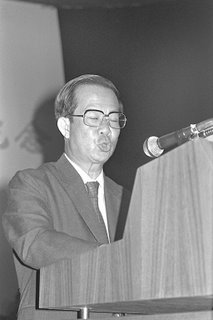 For the past month, I was pleasantly surprised by the word of encourage and the positive feedback on the Part I: History and Founding of PAP. I thank all comments and emails that I have received and glad that you all found it interesting. History, to most students, is never as exciting when in the syllabus. In the end, history covers only winners from battles and is told by those won it. But if history has a life of its own, it might be told from a different perspective, a perspective that I hope to tell.
For the past month, I was pleasantly surprised by the word of encourage and the positive feedback on the Part I: History and Founding of PAP. I thank all comments and emails that I have received and glad that you all found it interesting. History, to most students, is never as exciting when in the syllabus. In the end, history covers only winners from battles and is told by those won it. But if history has a life of its own, it might be told from a different perspective, a perspective that I hope to tell.
I was sitting in a bus yesterday, reading some printed articles on Dr Toh Chin Chye and Dr Goh Keng Swee (I’m probably the only blogger that does his “homework”) before writing this article, when I saw a secondary school girl holding a History textbook on the founding of Singapore. I wonder to myself, how different is the textbook (portraying the glorified history of PAP) and how much it differs from reality? Would the textbook ever said about the “Man Who Made PAP: Dr Toh Chin Chye” or the “Man Who Made Singapore: Dr Goh Keng Swee”? In the end, textbooks are made to be student-friendly and revolve around one leader and one story from one perspective. In rewriting this history, I hope to “popularize” history via the medium of blogs, not to increase the traffic flow of this blog but to tell a more complete history. So, I’ll do my research and lengthy readings in hopes that people would read the forgotten history of us.
Dr Toh Chin Chye: The Man Who Made PAP
“How can we say, who contributed more? Without Dr Toh holding the fort in the PAP, we might never have held the Party together.”
Lee Kuan Yew, Valedictory Dinner, 22 August 1981.
Dr Toh was the founding Chairman of the PAP in 1954. In 1959, he was the Deputy Prime Minister of Singapore and then in 1968, Minister of Science and Technology, Vice-Chancellor of the National University of Singapore, and in 1976, Minister for Health and Education. He left the Cabinet in 1980 but remained as the MP for Rochore. He was a vocal backbencher until 1988, when he retired from politics.
To many Singaporeans, either they have never heard of Dr Toh Chin Chye or only remembered his as one of the Deputy Ministers to Lee Kuan Yew. While the Party was in turmoil, Dr Toh held the PAP together. In two occasions, then-PM Lee Kuan Yew offered his resignation and Dr Toh could have chance upon it and made himself the Prime Minister. For the better good and stability of the Party and Singapore, Dr Toh rejected the proposal and threw his support behind Lee Kuan Yew. Singapore’s success is NEVER and NOT by chance or the miracles of one man. It is the sweat, blood and effort of talent men, like Dr Toh and Dr Goh, who served and toiled for Singapore not for their own fame and fortune but for Singaporeans.
Humble Beginnings of the Indomitable Fighter
Dr Toh was born in Batu Gajah, near Taiping, Perak in 1921. Like the best and brightest of his generation, he pursued his studies at Raffles College, Singapore. He was Lee Kuan Yew’s senior but they never knew each other then. Before he could further his studies overseas, the Japanese war broke out. During this period, Dr Toh first became a hawker assistant and grew potatoes and tapioca for his own survival. The Japanese Occupation changed his perspective, political outlook and was awakened to the injustice of colonial society.
While in London as a student from 1949 to 1953, he led the anti-colonial group of Malayan students known as Malayan Forum. The Forum provided a place for native nationalists to debate and to examine the future of Malaya. Before returning to Singapore, Goh Keng Swee, the then chairman of the Forum, nominated Toh to succeed him.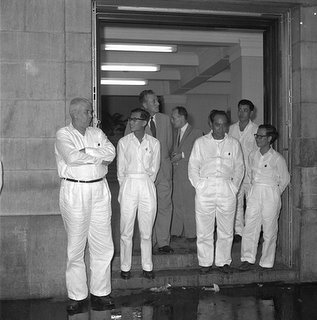
In his early years, he was very much a socialist and close friend of Dr Goh Keng Swee during his days in London. Together, they took up the political cause and came back to Singapore in 1953. Later, Dr Goh, Kenny Byrne and Dr Toh formed the Council for Joint Action with Lee Kuan Yew as the legal advisor. That was how LKY got involved in union politics. During then, LKY was also the legal advisor to Samad Ismail (editor of Utusan Melayu and ex-detainee), Lim Chin Siong and Devan Nair. The few of them would always meet in the “basement” of LKY’s house but with special attention from the “Special Branch” (old version of ISD), they would always be watched and risk being detained without trial. Toh did not belong to the first wave of founding members who met at LKY’s house; he was still in England when the “basement group” first met. However, after Dr Toh joined the group, it was Dr Toh who proposed the formation of an open and legal political party to champion the cause of nationalism and independence of Malaya.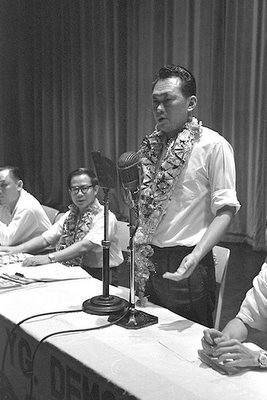 Founding of PAP
Founding of PAP
“Sometimes, I wonder what would have happened to our basement group had I not pushed for it to register as a political party. What is I had not come back to Singapore? You know, in 1953, I was advised to go to USA to continue my research. If I had gone that route, would anyone have started the PAP? Would the basement crowd have remained in Kuan Yew’s house? Would it have come together at all?” – Dr Toh Chin Chye.
To avoid complications such as being arrested by the Special Branch they formed a political party and registering as a society. Initially, the “Action Party” was coined and later, they added the word “People” into it. The word “Action” reminded Dr Toh of a lightning symbol and with other suggestions thrown in; the famous logo of PAP was born.
The “Chairman”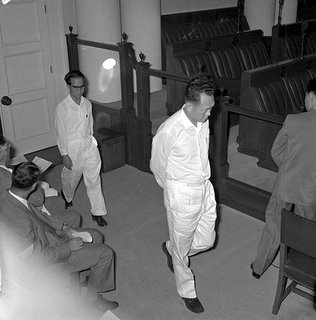
With the formation of the PAP, Dr Toh was appointed Chairman of the Party. During the 1950s, as the Chairman of the PAP, he led the PAP during its critical internal struggles between Left and Right. In 1957, the “communist (subjective on whether they are communist or not)” have taken over the Central Executive Committee. Dr Toh, Dr Goh and LKY lost control over the party. The old party constitutions provided for an Annual Congress, where every party member could attend the meeting and speak up, as well as vote for the CEC. At the Badminton Hall, where the Annual Congress was held, the place was filled with all sorts of people: Left Wing unionist, maybe people from the Special Branch and even Devan Nair’s sister was there.
After the Congress, Dr Toh asked LKY and Ong Pang Boon to stay behind and said, “We must have a cadres system. We cannot go on admitting people as ordinary members who can overthrow the CEC just like that!” In the end, T.T. Rajah took over as Party Secretary-General and his Left Wing crowd took over the whole CEC. But after then Chief Minister Lim Yew Hock clamed down on the riots and communist, many of them were under detention under the Emergency regulations and Dr Toh and LKY took over the party. Then, they brought in the Cadres system, system which the PAP adopts even until today.
Unquestioned Loyalty to LKY
When PAP won the elections in 1959, it did not mean that Lee Kuan Yew, PAP Secretary-General would be automatically become the Prime Minister. There were two candidates for that post: Ong Eng Guan, the popular and charismatic mayor of Singapore and Lee Kuan Yew. The PAP’s CEC held a vote to pick its Prime Minister, but there was an even split and thus a deadlock. Toh, as Chairman, held the casting vote, threw his support behind LKY and broke the impasse. If Toh has voted differently, LKY would not have become PM in 1959 and the history of Singapore and Malaysia would have turned out very differently.
In 1961, PAP suffered a traumatic party split. On June 1961, Lim Chin Siong wrote to Dr Toh, demanding the release of their Left Wing political colleagues. PAP could not agree to this with their prior agreements with the British. The beginning of the split between Left and Right was the Anson By-elections on July 1961. The Left demanded “internal democracy in the PAP” and the release of all political prisoners from detention. They were refused. The Left then threw their support to the rival candidate, David Marshall and he won.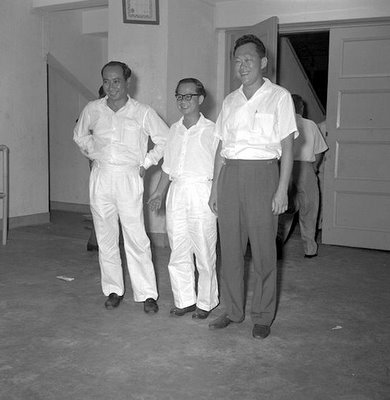
The final split came just few days later in the Legislative Assembly. Thirteen Left Wing PAP Assemblymen abstained from voting with the party line. They were dismissed from the PAP. In August 1961, they formed a rival party, the Barisan Sosialis, led by Dr Lee Siew Choh and Lim Chin Siong. They took 35 branch committees, 19 of the 23 organizing secretaries and an estimated 80 percent of the membership. PAP under LKY was a mere shell, according to Dr Lee. Both Dr Goh Keng Swee and Lee Kuan Yew were devastated and thought that it is the end of the PAP. But on man never gave up the fight as Dr Goh recalled the following conversation with Toh Chin Chye:
Toh: Why are you staring at the ceiling?
Goh: Do sit down, Chin Chye, we are all busted; the party secretaries, the PA (People’s Association), the organizing secretaries, the Work Brigade. I know the communists were organizationally much stronger than us. But I didn’t expect us smashed up like this in just a week.
Toh: I just come from Harry’s office. He was staring at the ceiling just like you did. You should snap out of this mood. The fighting has just begun. It is going to be long and nasty. But if we keep wringing our hands in anguish we are sure to lose. We should start thinking immediately of our next moves – how to rebuild the Party, rally the loyal Party members and how to carry the fight into the enemy camp.
A fight that Dr Toh would not shy away from, Dr Toh chose the most difficult of constituencies to contest and fought head on. In September 1963, he presided over the PAP’s historic election victory over the breakaway Barisan Sosialis. Rather than opting for a safer seat, Dr Toh chose to stand in Rochore constituency, a tough Chinese working-class area and a natural constituency for the Left-wing Barisan Sosialist Party. To add to his challenge, he was to face a formidable opponent, the Chairman of Barisan Sosialist, Dr Lee Siew Choh. In the hotly contested electoral battle, Dr Toh defeated the Chairman of Barisan Sosialist, Dr Lee Siew Choh, by the slimmest Election margin of just 89 votes.
Lee Kuan Yew’s Resignation
On at least two occasions, Toh Chin Chye’s name was floated as an alternative Prime Minister to LKY. In 1961, they lost two successive by-elections to Ong Eng Guan and David Marshall. On 17 July 1961, Lee Kuan Yew wrote a letter to Dr Toh, Chairman of the CEC. He wrote that the trade unions, the Middle Road Crowd wanted him to resign and they wanted Dr Toh to take over as the Prime Minister. Dr Toh read the letter to all the Cabinet Ministers and CEC members during a Cabinet meeting. All who were present were stunned. Yong Nyuk Lin asked Dr Toh, “Should we accept his resignation?” Dr Toh replied, “No,” because it will divide the government and it will appear to the people of Singapore that they are being unsteady. So they declined the resignation. Dr Toh could very well make himself as the Prime Minister, but he didn’t.
In 1964, in the aftermath of race riots in Singapore and Malaysia, LKY offered again to resign as PM in an attempt to ease the strained relations between Kuala Lumpur and Singapore. In the wake of certain extremist demands from UMNO (United Malays National Organization) to arrest LKY for the ostensible reason of preventing him from causing more political and ethnic tension within Malaysia, Dr Toh and his comrades stood by LKY. If LKY was arrested and detained without trial, Dr Toh or Dr Goh might have been the next logical choice to become PM of Singapore. Dr Toh’s support and ability to rally members behind LKY probably prevented the Malaysian government from arresting LKY.
Singapore’s Separation From Toh Chin Chye’s Perspective
By 1964 and 1965, tension between Malaysia and Singapore was mounting but both Dr Toh and S. Rajaratnam opposed the separation. Apparently, LKY anticipated Toh and Raja’s reluctance to sign the separation agreement and did not inform them of the discussion of Singapore’s secession in K.L. According to Dr Toh, LKY ensured that Rajaratnam and he did not travel together from Singapore to see him in K.L. This was a shrewd move to make sure that the men would not collude to reject separation.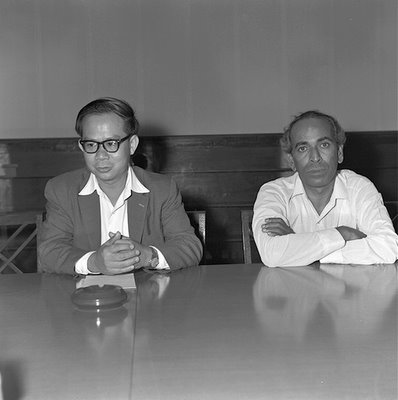
In the middle of the night of 20th July 1965, LKY called Dr Toh and asked him to drive to K.L. When he was in Sri Temasek, K.L., LKY told him of the news and was later joined by Rajaratnam and Ong Pang Boon. Dr Toh stayed behind in K.L. while LKY returned to Singapore to announce to the public. LKY asked Dr Toh to attend the Malaysian Parliament the next day. It was an unenviable task to face the uproar by the members of the Malaysian Solidarity Convention (a coalition of opposition parties formed by Dr Toh to compete the Elections in Malaysia for a “Malaysian Malaysia” – equal rights regardless of ethnicity). With LKY devastated over the separation and tearing on national television (and later seek solace in Changi Villa), Dr Toh and other Minister held the fort. Opposition members demanded Dr Toh for a parliament seating but was only able to recommence on December 1965. The crucial stabilizing role that Dr Toh played after the separation could not be under-estimated.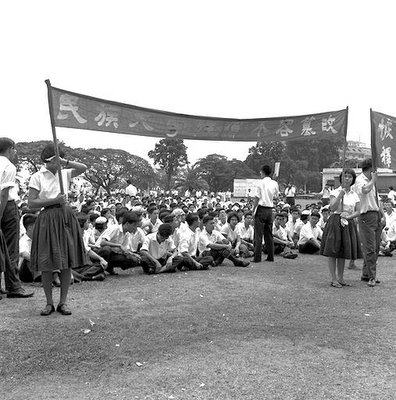 The Iron Chancellor and Nation Builder
The Iron Chancellor and Nation Builder
After Singapore’s independence in 1965, Dr Toh was DPM, Minister for Science and Technology, and Minister for Health. He chaired the Singapore Polytechnic and was Vice-Chancellor (VC) for the new University of Singapore (SU). Many had underestimated his role as the Vice Chancellor of SU. In many underdeveloped countries like Singapore, they faced the same problem of managing conflicting goals of promoting education in universities yet managing social unrest and instability caused by student leaders in these universities. Thus, Dr Toh’s appointment as VC was crucial to maintain political stability.
At SU, the VC quickly acquired a reputation of being a ruthless autocrat. This was largely due to his single-mindedness in attaining his academic reforms and furthering national goals of economic development. The amount of work which Dr Toh did, and the decisive and speedy way in which he did it, can only be described as Napoleonic. He inspected every division of the campus with an eye to efficiency and productivity. He had a strategic plan, which was to bring all the divisions he dealt with together in a totally new and spaciously adequate campus (Kent Ridge, present day NUS Campus). Dr Toh believed that, was he not autocratic, things would never get done and the university would never have been reformed.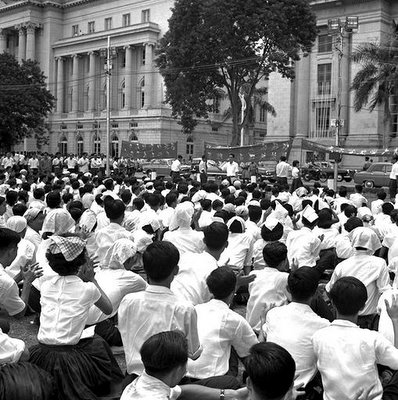 Iron Fist against Student Riots
Iron Fist against Student Riots
Despite Toh’s reputation as a tough VC, he had problems with radical students at SU. In 1974, the campus was rocked by student unrest. This took place just before Tan Wah Piow, the president of University of Singapore Students’ Union (USSU), was to appear in a district court on charges of rioting. In December that year, immigration officers accompanied by riot police conducted a pre-dawn raid at the university campus in Bukit Timah Road. They caught and deported six students who were active in the USSU.
The detentions triggered off student protests, boycott of lectures and approximately 2000 students, out of a total of 7500 enrolment, turned up for a two-hour student rally against the arrest. This was the largest student demonstration in Singapore’s history. However, Toh avoided further punitive action against the dissenters and simply allowed the protests to peter out.
Nonetheless, the contribution by Dr Toh to the tertiary education was significant and positive. He set in place a university that contributes rather than hinders Singapore’s growth. Today, the shape and success of NUS and NTU bears Dr Toh’s imprints.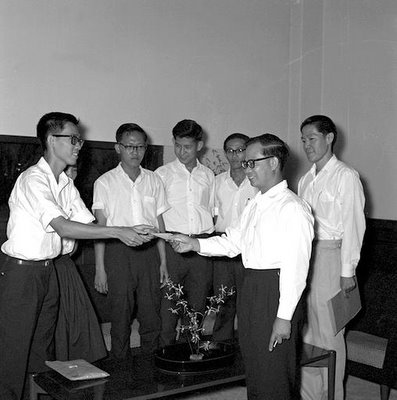 No “Dumb Cow”: Dr Toh the Vocal Backbencher
No “Dumb Cow”: Dr Toh the Vocal Backbencher
After leaving the Cabinet under the LKY’s renewal and infusion of new blood policy, Dr Toh became a PAP backbencher (meaning he step down as a Minister to become only a Member of Parliament). Dr Toh was openly critical of certain public policies which he deemed to be unsound and later, became one of the most vocal and critical MP against the PAP. Many suggested that his critical stance towards the ruling party was a case of “sour grapes” from losing his position as a Minister as well as unceremonious exit but this argument was unfounded. In fact, when he was in Cabinet, LKY identified Dr Toh as a Minister who sometimes would disagree with him over the matters of principles and policies. In the old political saying, “you are where you sit” and as a backbencher, Dr Toh felt that he was no longer constrained by the principle of collective responsibility as a Cabinet Minister is expected to defend. Rather, he chose to exercise the responsibility of a backbencher to question policies that he considers faulty. He famously said, “In this last term, I hope I will be of public service and not a wallflower in the chamber of parliament of a dumb cow.”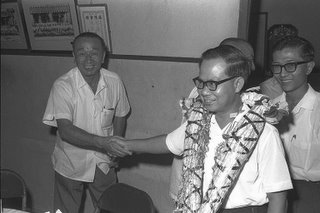
One reason for his confidence in speaking against the government was his solid bastion in Rochore constituency. Some speculated that he might quit the PAP and run as an independent candidate (for which he stands a high chance of winning his ward), but we would never know and he would never had that chance. In 1988, Rochore Constituency disappeared from the political map after the redrawing of electoral boundaries.
Final Message to the Singaporean Youths
In a rare public interview in 1997 Radio Corporation of Singapore, Dr Toh passionately bemoaned the lack of idealism and creativity among the young and its implications for the future of Singapore. He said:“I would say the generation of the ‘50s and ‘60s took the plunge into politics without ever calculating the costs of the risk and the benefits to be gained. They were driven by ideology. Today’s generation has no culture and averse to taking political risk. Really, an interest in politics is very necessary for the future. But I cannot blame the present generations, because they see the heavy-handed response by the government to dissenting views, even though they know that these matters involve their daily lives.
So the result is that we have produced a younger generation who are meek and therefore very calculating. They are less independent-thinking and lack in initiative. It does not bode well for the emergence of future leaders in politics and business. Robots and computers can be programmed or if you like, can be trained. But the trouble, of course, is that computers lack soul and what we need in Singapore is soul. Because it is soul that makes society.”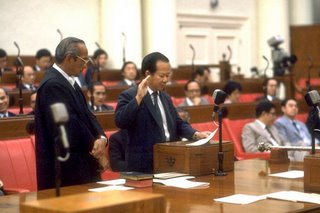 His words are aptly prophetic to our present society. Are we a soulless society? Maybe we are, but it is heartening to see great men like Dr Toh Chin Chye made passionate dreams for Singapore. Both in the development and building of modern Singapore, Dr Toh was instrumental in making the Singapore we know today. Dr Toh is truly one of the founders of Singapore.
His words are aptly prophetic to our present society. Are we a soulless society? Maybe we are, but it is heartening to see great men like Dr Toh Chin Chye made passionate dreams for Singapore. Both in the development and building of modern Singapore, Dr Toh was instrumental in making the Singapore we know today. Dr Toh is truly one of the founders of Singapore.
If you ever had the patience to read this final sentence, you would guess that this article is too lengthy to include the story on Dr Goh Keng Swee. Thus, I would write it separately in the later weeks.
Source: Leaders of Singapore, by Melanie Chew (1996) and Lee's Lieutenants : Singapore Old Guard: by ER Lam Peng (2000) . Photos are available at National Archives, public domain. Not for reproduction.http://singaporegovt.blogspot.com/2006/02/part-ii-true-founders-of-singapore-man.html
-
Originally posted by Susanteo2011:
a PAP dog just died.......................an old one at that.....................
as significant as................a tree losing a leaf..................
Please don't insult the dead.......and he is the founder of PAP and what's wrong with it...I think you might as well not comment this topic...
-
RIP Mr Toh Chin Chye... Ur name sounds like "Knife-Anyhow/Anything-also-can"
-
Originally posted by ^Acid^ aka s|aO^eH~:
RIP Mr Toh Chin Chye…
Ur name sounds like “Knife-Anyhow/Anything-also-can”
think he got plenty explaination to do. -
born in 1921???means dat in 1944 he wasin his early 20s?
was he aNOTHER JAP SUPPOERTER
-
RIP sir
thank you for your service to the country and having the grace to step aside when it was time like all good men and leaders should...
you and your like will be missed... because we will never see such again...
-
that was the 7th Thinking Hat I mentioned our generations had missed...the hunger to survive, to fight for what the visions lie ahead in the midst of defeats in a barren land without giving up...
"Why are you staring at the ceiling?"....
-
Together with Old Guard Leaders Lee Kuan Yew, S Rajaratnam and Goh Keng Swee, Dr Toh had helped lay the foundation for future generations of Singaporeans.
All have the sense to retire gracefully, and pursue their interest at leisure, except one, who is afraid of going down the drain.
-

The first in the Great Singapore Stories series comprises 10 books in an attractive collection on the “FOUNDING FATHERS” who were at the start of the Great Adventure of Independent Singapore. What do we know of the Singapore story today?
We dismiss the past as dry history, a list of dates or milestones of events. How many people know:
- the huge effort to relocate our people from farms to flats?
- the secretive efforts to build Singapore’s defence force?
- Singapore’s industrialisation drive – once called “Goh’s folly”?
Each book in FOUNDING FATHERS has:
- the story of one Singapore founder and his contribution in the endeavour
- growing-up days
- surprising things we never knew about the man
- what others say about him
- snapshots linking the past to present-day context
- rarely seen pictures from family archives
Titles:
- David Marshall - The Legal Eagle
- Devan Nair - The Rebel With A Cause
- Eddie Barker - The Gentleman Politician
- Goh Keng Swee - The Master Sculptor
- Lee Kuan Yew - The Man Of Firsts
- Lim Kim San - The Big Builder
- Ong Pang Boon - The Bespectacled Crime Buster
- Othman Wok - The Dashing Peacemaker
- S. Rajaratnam - The Voice Of A Nation
- Toh Chin Chye - The Quiet Revolutionary
http://www.stpressbooks.com.sg/Founding-Fathers-GREAT-SINGAPORE-STORIES-series.html
Each so called "founding father" contributed in his own way. And each slowly faded away from the limelight.
Except for one. There is a problematic character among the founders. There is an odd one out.
-
They are the true founding father of Singapore who lay the foundation for the future generation.
They worked hard for the people without self-declaring as talent and asking for million dollar salary.
They deserved the utmost respect from every single Singaporeans.
As for the old man who do not know when to quit, he is just being human and maximisng out the benefit.
-
When a man's wife and only daughter dies before him, it is a very very sad thing. May he rest in peace. It must also be very sad for Mr Lee seeing the passing away of all his former Old Guard colleagues/comrades. It is indeed the passing of an era.
-
Dr Toh was a physiologist, social philosopher and statesman, and an indefatigable fighter..
He fought so much to be with us ...... with his great understanding of the physiological instincts and needs of the masses..
R.I.P
-
He who knows the ground knows the people
-
The old guards EXCEPT THE GREEDY EVIL OLD MAN LEE KUAN YEW served the nation without asking for more money.
Damn it LEE KUAN YEW, waiting for your demise, you old evil greedy jiang si! You turned Singapore into a Business Organisation! A country is a country not meant to be run as a business!
Salute and respect to you, Dr Toh! Rest in peace!
-
Originally posted by Medicated Oil:
They are the true founding father of Singapore who lay the foundation for the future generation.
They worked hard for the people without self-declaring as talent and asking for million dollar salary.
They deserved the utmost respect from every single Singaporeans.
As for the old man who do not know when to quit, he is just being human and maximisng out the benefit.
Leaders no matter how good or great, are not faultless. To truly evaluate a leader's contributions and understanding of the ground one has to look at what he had done whilst in office/ position of appointment. Tirade, debates, counter arguements when one's a back bencher critic counts less in the total wayang of things! It's a wonderment that people always say such nice things about the dead! They should have told them( the dead) , whilst they(the dead) were still living! -
Last goodbye to Dr Toh Chin Chye
By Hoe Yeen Nie | Posted: 07 February 2012 1519 hrsSINGAPORE: The funeral procession of the late Dr Toh Chin Chye took place on Tuesday morning.
Dr Toh died at the age of 90 on 3 February.
The former Deputy Prime Minister was given the honour of a ceremonial gun carriage for his final journey.
Shortly before 10am, the band struck up its solemn tune the "Dead March from Saul" as the late Dr Toh Chin Chye left his Greenview Crescent home for the last time.
His casket was draped with the state flag he helped design, and borne on the shoulders of eight officers from the police and armed forces.
Placed carefully on top of the casket, was the Order of Nila Utama, awarded to Dr Toh in 1990 for his contributions before and during the merger with Malaysia.
At government buildings across Singapore, the flag flew at half-mast, a mark of respect for the man regarded as one of the country's founding fathers.
Dr Toh had requested for a private funeral.
In recognition of his contributions, the government accorded him the honour of a ceremonial gun carriage for his final journey to the Mandai Crematorium.
Led by Dr Toh's son-in-law, Mr Johnny Ng, family and friends observed the proceedings in silence.
Those in the procession include former MPs Chan Chee Seng and Ho Geok Choo, as well as many whose lives had been touched by Dr Toh.
There were other well-wishers too, who had come just for a final glimpse.
As the clock struck 10, the cortege began its slow procession, making its way down the narrow streets of Dr Toh's neighbourhood.
It then travelled along Lornie Road and Upper Thomson Road, before arriving at the Mandai Crematorium.
- CNA -
Dr Toh was a kingmaker, the shadow master behind the PAP's throne.
A man who bridged the leftists and the rightists within the PAP party.
A man who held the party together at its darkest hours.
A man with deep conviction for the poors and the underdogs.A man who never wavered on his conviction on the equality of men.
A bitter man who criticised the party to ther end for being sidelined at the height of his career, at the age of 59.
Then PM Lee said: “As a backbencher, he held his views as firmly as ever, and was often sharply critical of Government policies. From time to time, he would clash with Ministers. The Ministers could not always accept Dr Toh’s point of view, but they always took his criticisms seriously.”
Rajaratnam said :"A simple man but not a simpleton". Dr Toh was not one who looked for a fight, "but once in a fight, where honour is at stake, he fights unto death".
LKY and PAP own their successes most to this man.
RIP DR Toh, you have done much for all Singaporeans!
-
MARCH 24, 1957. People's Action Party (PAP) secretary-general Lee Kuan Yew was in London as the party's representative for the second all-party constitutional talks that Lim Yew Hock's government was holding with Singapore's colonial masters.
Unbeknownst to Mr Lee, back in Singapore, a stormy meeting, chaired by Dr Toh Chin Chye, was being held at the PAP headquarters on Neil Road.
Concerned with the internal security provisions that the British would impose on Singapore, 19 pro-communist trade unions within the party had demanded for this special meeting to force the PAP to denounce the London talks.
Tensions between the pro-communist and non-communist factions in the party - long simmering under the surface - had suddenly erupted into the first open challenge against the leadership helmed by Mr Lee.
Held from 8pm to 3am the following day, this marathon meeting - etched in PAP folklore - offered party members, for the first time, a glimpse of the stuff that the diminutive Dr Toh was made up of - "iron" and "guts", as some would later put it.
For seven hours, the PAP chairman bore the brunt of the onslaught from the leftists. But when the meeting ended, not only had Dr Toh not given in an inch, he also sent the dissidents packing with a severe dressing-down they would not forget for a long time.
According to the late Mr S Rajaratnam, Dr Toh was not one who looked for a fight, "but once in a fight, where honour is at stake, he fights unto death".
And Mr Lee said of the man who was party chairman from 1954 to 1981: "Without Dr Toh holding the fort in the PAP, we might never have held the party together."
The gutsy side of Dr Toh would crop up again and again throughout his political career, especially during the tumultuous 1960s. Even during his twilight days as a politician in the 1980s, he refused to be a "dumb cow" - ever ready to speak out against government policies that he felt were not beneficial, or fair, to the people he had devoted his whole life to serving.
FROM STUDENT TO POLITICIAN
Dr Toh was born on Dec 10, 1921, in Batu Gajah, a small town in Perak, to a bicycle shop owner and his homemaker wife.
The brilliant student graduated with a First Class Diploma in Science from Raffles College in 1946 and went on to achieve greater academic successes on scholarship after scholarship.
It was while he was pursuing his doctorate in Physiology at the National Institute for Medical Research in London in the late 1940s that Dr Toh met the rest of Singapore's founding fathers - Mr Lee, Dr Goh Keng Swee and Mr S Rajaratnam - in an anti-colonialist discussion group called the Malayan Forum.
After they returned to Singapore, the group continued to meet clandestinely in the basement of Mr Lee's home regularly, discussing how to fight for the country's independence.
Afraid that the Special Branch might round them up for their activities, Dr Toh suggested that they register as a political party. The PAP was thus born on Nov 21, 1954.
When the party won control of the Legislative Assembly in the 1959 elections, there were two men contesting for the premiership: Mr Lee and former Mayor Ong Eng Guan.
According to some accounts, a vote was called for among the PAP Central Executive Committee to choose between the two men.
Once again, at this critical juncture that could have changed the course of the PAP's - and thus Singapore's - history, Dr Toh played a pivotal role. When the CEC vote came to a 6-6 deadlock, it was Dr Toh's vote as party chairman which gave Mr Lee the edge over Mr Ong.
Mr Lee became Singapore's first Prime Minister and Dr Toh became the Deputy Premier. He could well have become Singapore's second Prime Minister on two occasions - when the PAP lost two by-elections in quick succession in Hong Lim and Anson in 1961.
After each loss, Mr Lee had tendered his resignation to Dr Toh but, each time, the party chairman refused to accept it and continued to throw his full support behind Mr Lee.
The year 1961 was indeed a trying time for the PAP, as the anti-communist and pro-communist factions became locked in a fierce power struggle.
In July that year, 13 left-wing members, led by Dr Lee Siew Choh, formed the Barisan Sosialis after they were expelled from the PAP following their attempt to topple the government over the issue of merger with Malaysia.
But the split left the PAP teetering on the brink of collapse after almost all of its party branches were taken over by Barisan.
Once again, it was Dr Toh who, in the words of former Member of Parliament (MP) and diplomat Lee Khoon Choy, "managed to inspire the other people to carry on".
Four years later, the PAP government was once again faced with another major crisis as Singapore's post-merger problems with the Malaysian federal government in Kuala Lumpur reached boiling point.
According to Mr Lee Khoon Choy, Prime Minister Lee consulted both Dr Toh and Mr Rajaratnam on the issue of separation.
"The first thing he (Dr Toh) did was to take out a piece of paper ... and he started calculating the pros and cons," Mr Lee Khoon Choy said.
As Deputy Prime Minister and PAP chairman, Dr Toh's signature on the Separation Agreement with Malaysia in August 1965 was crucial.
Dr Toh - with memories of the 1964 racial riots in Singapore still fresh in his mind - would explain later that he agreed to the separation because he accepted Malaysian Prime Minister Tunku Abdul Rahman's explanation that he "had no power to solve this rising (racial) tension in Malaysia and there might be bloodshed".
"Knowing Malaysia well - we had our share of rioting in Singapore, knowing Malaysia, it is bigger ... he (Tunku Abdul Rahman) really would face a problem. I think that was what persuaded me in the end to give in," Dr Toh said.
HIS YEARS AS A MINISTER
Three years (1968) after Singapore became a full-fledged independent nation, Dr Toh became the Minister for Science and Technology, a post he would hold until 1975.
At the same time, he was appointed as the vice-chancellor of the University of Singapore.
His sole focus was on tweaking the university's structure and focus so as to meet the young nation's needs.
To fuel the largely industrial economy Singapore was then, Dr Toh established the faculties of Engineering and Architecture and also introduced professional courses such as business administration and accountancy.
He was also responsible for engineering the convergence of the four different campuses of the university to its current location at Kent Ridge.
Putting these reforms in place was no walk in the park for Dr Toh. But the tough man - described by many who knew him well as one who says what he means and means what he says - was clear about what he wanted to achieve and he was not going to let anything disrupt his plans.
As vice-chancellor, Dr Toh had no qualms about clamping down on student demonstrations and political activities on campus, leading many to squirm at what they perceived as authoritarian methods.
He defended himself by saying "things would never get done and the university would not have been reformed" if he were not autocratic.
THE VOCAL BACKBENCHER
After his last Cabinet post as Health Minister from 1975 to 1981, Dr Toh became a backbencher. But even during those four years when he was on the other side of Parliament, Dr Toh was prepared to fight for what he believed in - even if it meant taking on his former Cabinet colleagues in public.
He spoke up against policies such as the Medisave Scheme and the age limit of CPF withdrawal.
But it was his strong stand against the graduate mother policy - where children of graduate women were given priority admission to schools - and the "Killer Litter Bill" - which would allow the Housing and Development Board to repossess flats occupied by people convicted of killer litter offences - which made the headlines.
As he memorably put it: "In that last term (as MP), I hope I'd be of public service and not be a wallflower to decorate the chamber in Parliament or be a dumb cow."
And the moralist in him meant that he was never bothered by how others viewed him as long as he was convinced he was fighting for justice.
For one who had devoted 26 years of his life to public service - 22 of them as a Cabinet minister - Dr Toh never had any illusions as to what it meant to serve.
As he once said: "Once you are in the front edge of administration, there'll be barbs and arrows. Don't expect roses. I never expected roses."
He might not have received any roses - especially from a younger generation of Singaporeans for whom the name Toh Chin Chye hardly ranks high in terms of familiarity - but his contributions as one of the country's Founding Fathers will forever be etched in the annals of Singapore's modern history.
http://www.todayonline.com/Singapore/EDC120204-0000018/Dr-Toh-Chin-Chye
-
What Toh Chin Chye really did for Singapore?
A few days ago, former PAP minister cum co-founder Toh Chin Chye kicked the bucket. From the MSM, I gather the impression that other than holding the most insignificant portfolio like Minister for Science and Technology and Minister for Health, Toh basically did nothing.Among the 1st generation PAP leaders, we all knew Rajaratnam spearheaded foreign affairs. Goh Keng Swee destroyed Singapore well-being in the long run by ruining domestic capital and set up the abominable GIC with Jewish Rothschild shylock. We knew Lim Kim San put Singaporeans into debt by forcing us to stay in HDB. That given a choice, most would prefer to stay in the worst slum than PAP's HDB barrack. We knew Kuan Yew cannot do any good things but ISA, FT polices, property ponzi....etc.
But what did Toh Chin Chye did, that make him stand side by side with Raja and Goh, and even ahead of Lim Kim San?
Toh Chin Chye was the kingmaker
Toh was beholden to Kuan Yew because he re-created PAP modelling after tyrannical Lenin's Communist Party. This helped Kuan Yew to consolidate power by suppressing grassroot democracy.According to wikipedia, The election of the CEC through the PAP cadre system has been described as a "closed system" in which "the cardinals appoint the pope and the pope appoints the cardinals. The PAP's organisational structure has Leninist roots whereby a group of elite PAP members known as cadres elect 18 CEC members from a list of candidates. Originally when this structure was organised in 1957, the outgoing committee recommended a list of candidates for the next CEC. This has been changed recently so that the CEC nominates eight members and the party caucus selects the remaining ten.
The cadre system was started in 1957 by Toh Chin Chye, in an effort to prevent the popular leftist faction of the PAP, which dominated the early Party at the grassroots level and many of its committees, and composed much of its early membership, from ever taking control of the CEC again.
Before 1957, every party member could vote in CEC elections. However on August 9 1957, the leftists took control of the CEC, and the original founders (the "Peranakan Circle") lost control. After Lim Yew Hock, cracked down on many of the leftist leaders in the CEC in 1957 (as well as many non-PAP leftist leaders in general), the Peranakan Circle regained control of the CEC.
CNA today wrote that, in a tribute years later, Mr Lee Kuan Yew said without Dr Toh holding the fort in the PAP, the party might never have held together. Lee was wrong, without Toh, the party would still exist but Kuan Yew would most likely not become the PM.
Toh had few occasions to become PM but he supported Kuan Yew. He supported Kuan Yew in all the inflexion points.
To conclude, Toh did nothing for our country, or rather his works were mostly destructive. He has such a high standing in PAP because without him, Kuan Yew would almost certainly not ascend to power. And his destruction of party democracy means Kuan Yew is able to have a iron grip of the party for as long as he like.
Toh was spurned by Kuan Yew
He was not given any significant portfolio. He watched and saw all his PAP buddies rotating in and out of prestigious appointments such as defence, finance, foreign affairs....etc.After doing running dog for Kuan Yew, he was kicked out mercilessly, in all major projects of nation building. This is the reason till this date, no one can tell what Toh really does. He was just a spent stepping stone.
http://veritas-lux.blogspot.com/2012/02/toh-chin-chye-what-toh-really-did-for.html